In this week’s review of Court Judgments, we look at Supreme Court’s observation regarding departmental proceedings and criminal proceedings being different with no bearing on each other, the Delhi High Court’s decision regarding the claim on Tehbazari right, and its judgment on non-infringement of trademark regarding the name of a drug. We also look at the Gujarat High Court’s judgment on the non-liability of compensation relating to the Motor Vehicle act and the J&K High Court’s observation regarding proceedings under the Domestic Violence Act.
Supreme Court: Employee dismissed after disciplinary proceedings cannot be reinstated merely because he was acquitted in a related Criminal Case
Supreme Court bench comprising of Justice S. Ravindra Bhat and Justice Sudhanshu Dhulia observed that an employee who was dismissed from service due to a disciplinary enquiry cannot be reinstated merely because he is acquitted by the criminal court by giving the benefit of the doubt for the same set of charges.
As per the case details, Phool Singh joined Rajasthan Police Service as a constable. There was a departmental proceeding initiated against him for three allegations – consumption of alcohol, indecent abuse, and demand for a bribe of Rs.100 and firing at the public that was chasing him.
These allegations were proved in the departmental enquiry, and he was dismissed from service. An FIR was also lodged against him under Sections 392, 307 IPC and Section 34 of the Police Act read with Section 3/25 of the Arms Act. He was convicted of these charges in the Trial Court.

However, the Appellate Court upheld his appeal and acquitted him giving him the benefit of the doubt. Based on this acquittal, he moved an application with the authorities for reinstatement, which was not responded favourably by the authorities. He proceeded to file a writ petition, which was taken note of by the Rajasthan High Court and directed his reinstatement.
The State Government filed an appeal in the Supreme Court asking whether he can be reinstated in service as he has been acquitted by the Criminal Court for the same set of charges.
The bench referred to earlier cases, where-in it was consistently held that their two proceedings – Criminal & Departmental are different. It observed that merely because one was acquitted in the criminal court does not result in reinstatement of someone who is found guilty in the departmental proceedings.
The court also added that the acquittal by the criminal court was not an honourable acquittal as it was based on the benefit of the doubt. Hence the Supreme Court Bench allowed the appeal and set aside the judgment of the High Court for reinstatement.
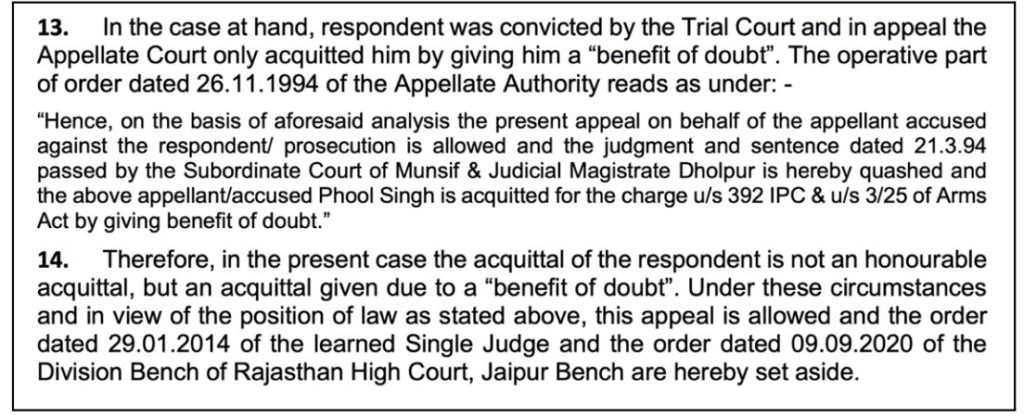
Delhi HC: Manufacturer can’t claim exclusivity over Trademark when it is derived from Principal Ingredient of Drug
In the case of Sun Pharmaceuticals Ltd vs. Hetero Healthcare Ltd. & Anr., the Delhi High Court rejected the appeal of Sun Pharma, which claimed Hetero HealthCare’s drug used to treat advanced breast cancer had infringed its trademark.
The bench comprising of Justice Vibhu Bakhru and Justice Amit Mahajan was looking into the appeal by Sun Pharmaceutical Laboratories Ltd, challenging an order by Commercial Court. A suit was earlier filed by Sun Pharma, alleging the infringement of trademark “LETROZ” and seeking a permanent injunction restraining Hetero from using the brand, ‘LETERO”. Sun Pharma claimed that it has been using the trademark since 2001, for a generic drug for second-line treatment of advanced breast cancer.
The division bench noted that the mark adopted by Sun Pharma was the first six letters of the ingredient, “Letrozole”, which is the international non-proprietary name of salt, and upheld the earlier order issued by Commercial Court.

The High Court concurred with Commercial Court that there is little possibility of confusion or deception in the purchaser’s mind based on the name of the drugs i.e., Sun Pharma’s Letroz and Hetero’s Letero.
It referred to an earlier judgement in Panacea Biotec Ltd vs. Recon Ltd, where it was held that no distinctiveness or exclusiveness can be claimed by the manufacturer when the name is derived from the word of the principal ingredient being used in the manufacture of the drug.
Apart from the possibility of confusion in the name, the court also looked into any possible harm resulting from the confusion among the names of the drugs.

The court also noted that the packaging and the colour scheme are also not similar, which otherwise would have caused confusion. The court proceeded to dismiss the appeal.
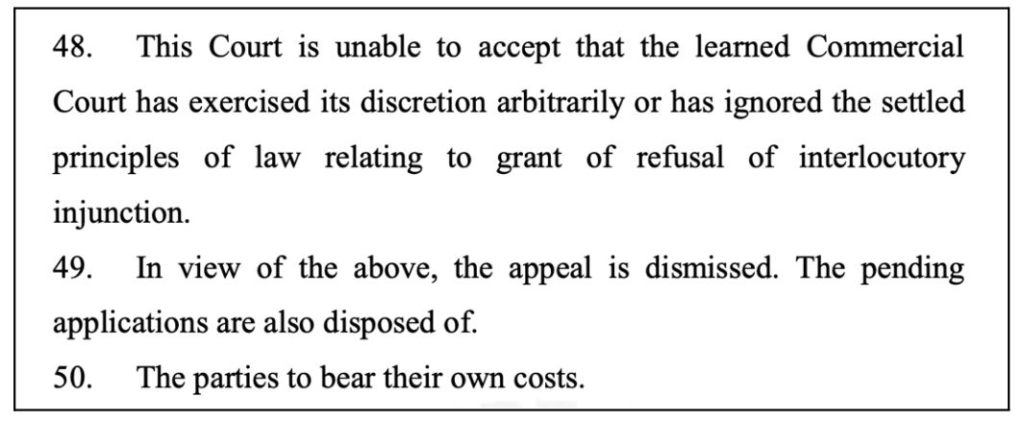
Gujarat HC: Insurance Company not liable to Compensate Person travelling in Goods Vehicle Prior to 1994 amendment
A single bench of Gujarat High Court comprising of Justice Hemant Pracchak held that an insurance company is not liable to compensate a person travelling in a Goods Vehicle if the accident took place prior to the 1994 amendment of the Motor Vehicles Act, 1988.
The bench was hearing an appeal against the judgment of the Motor Accident Claims Tribunal, which allowed the claim petition partly by holding both the insurance companies liable and awarding Rs. 4.1 lakhs of compensation.
The insurance company has filed the appeal based on New India Assurance Company Ltd vs. Asha Rani and others, 2003. The insurance company further stated that in the policy of the vehicle involved, no extra premium paid by the owner to cover the passengers. Hence, extra coverage was not provided.
As per the 1994 amendment to the Motor Vehicle Act, Section 147 mandated a policy of insurance against the death or bodily injury to any passenger of a transport vehicle (including goods vehicle), caused by the use of the motor vehicle in a public place.
Based on the details of the case, the single-judge bench exonerated the insurance company from the liability, as the deceased was travelling in a goods vehicle and the accident took place on 09 January 1994, i.e., prior to the date of the amendment.
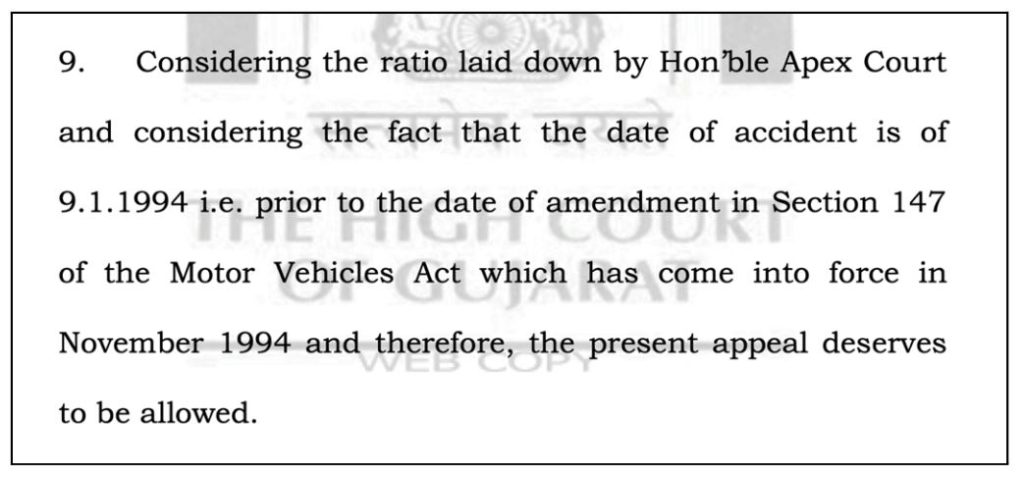
The court allowed the appeal. It also directed that the claimant is entitled to compensation from the other insurance company and the company can recover 50% amount from the owner and driver of the vehicle.
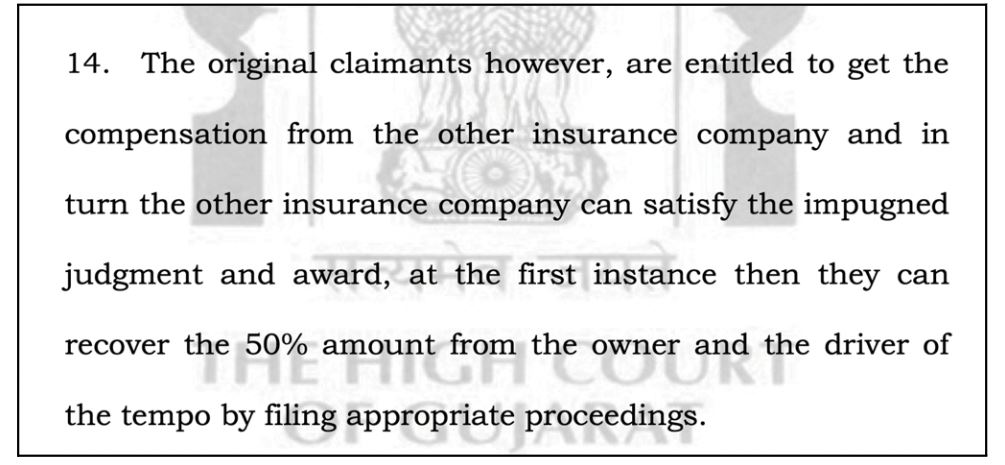
J&K&L HC: Proceedings under Section 12 of DV Act cannot be equated with lodging a criminal complaint
In the case, Altaf Ahmad Zargar vs. Mst Sana & Ors, Justice Sanjay Dhar of Jammu and Kashmir and Ladakh High Court, ruled that proceedings under Section 12 of the Domestic Violence Act cannot be equated with the lodging of a complaint or initiation of prosecution.
Hence, the Magistrate is within his jurisdiction to revoke his order of issuing summons or even drop proceedings, even after obtaining a response from the husband, relatives, etc.
The petitioners of the case have filed a plea challenging the application filed by the respondents against them under Section 12 of the Protection of Women from Domestic Violence Act, 2005, which was pending before the court of Judicial Magistrate, Srinagar.
An initial application was filed by the respondents before the Magistrate, which was later withdrawn citing that the parties have settled the disputes outside the court. However, a second application was filed by the respondents.
This was contended by the petitioners in their plea, that a second application under the provisions of the DV act on the same cause amounts to abuse of process of law and hence deserves to be quashed.
This was contested by the respondents stating that the cause of action for both applications is different. The first one relates to domestic violence from the period April 2018 to 24 August 2021. The second application relates to domestic violence from 09 October 2021.
Justice Sanjay Dhar observed that the proceedings under Section 12 of the DV Act cannot be equated with the lodging of a criminal complaint or initiation of prosecution, since the proceedings are not criminal in nature. Therefore, there is no bar on altering or revoking an order by the magistrate.
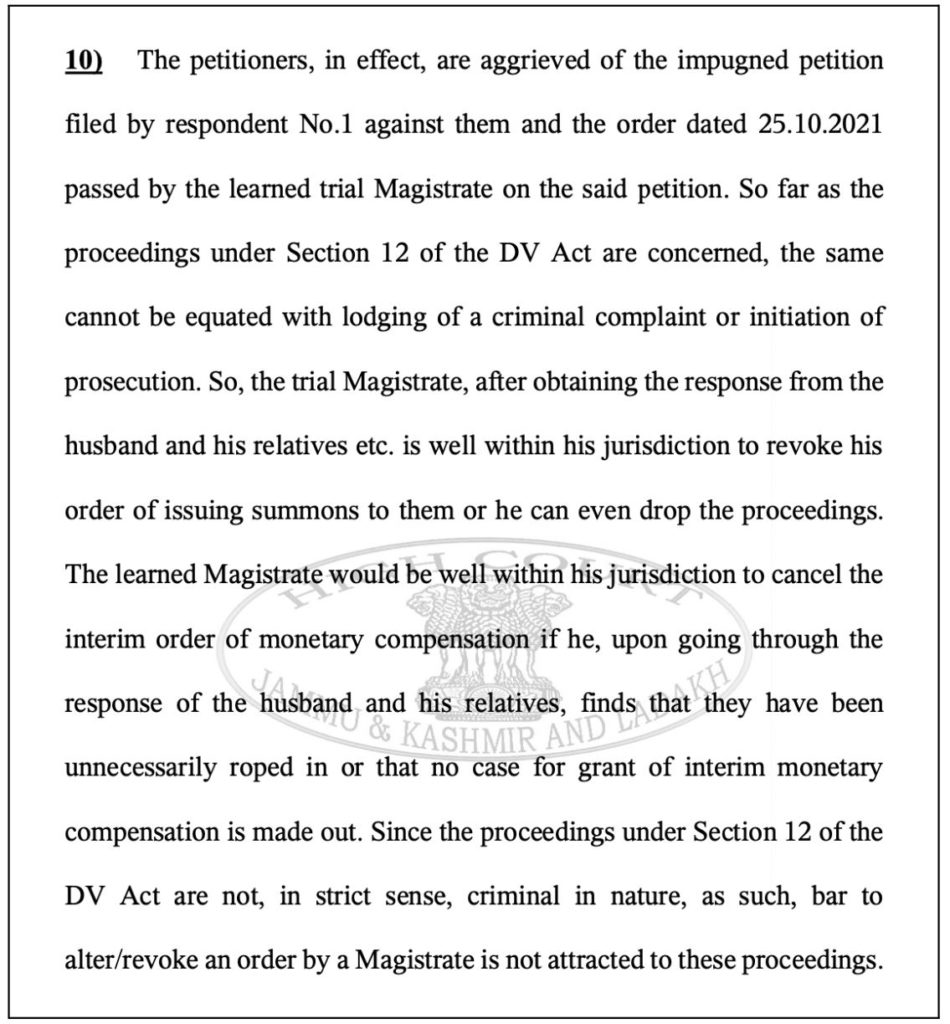
Hence, the court dismissed the plea and directed the petitioners to respond to the application filed with the Judicial Magistrate.
Delhi HC: Mere possession of Tehbazari right does not entitle occupant to usurp govt land, raise ‘pucca’ construction
In the case, Ved Prakash Manchanda vs. Delhi Urban Shelter Improvement Board & Ors, the Delhi High Court observed that mere possession of a Tehbazari right does not entitle the occupant to usurp government land or to raise a pucca construction on it.
A Tehbazari right or license is issued to hawkers to sell at a particular place. In this case, a plea was filed by Ved Prakash Manchanda seeking directions to the authorities to regularise his long and continuous occupation of premises in the city’s Madangir, by executing a lease deed or any other relevant document.
The petitioner has stated that he was using this site as a Tehbazari site from 1990-91 and the authorities used to collect license fees, damages, penalties, etc from time to time. Further, an electric connection was also sanctioned earlier based on the ‘No Objection Certificate’ issued by the authorities.
He received a regularization notice from the authorities and was called upon to pay the regularization charges within the stipulated period. He has deposited the specified sum but has not received any lease deed or other documentation despite the payment.
He approached the Secretary, Public Grievances Commission, Delhi Government to get the direction to execute the Sale Deed. He further filed a plea in the High Court, which directed DUSIB (Delhi Urban Shelter Improvement Board) to take the decision to either execute the sale deed or to pass a rejection order.
Accordingly, DUSIB proceeded with the rejection order and claimed that the petitioner has trespassed the government land and is required to be evicted. Subsequently, the premises were sealed.
The petitioner filed a plea with the Lieutenant Governor of Delhi, challenging the order of DUSIB, which was rejected. A plea was then filed in the Delhi High Court challenging the order of the LG, Delhi.
DUSIB has contended that the land was encroached by the petitioner, which was earlier earmarked for a community toilet and has erected a multi-storeyed building. There are no title documents that would establish his ownership. The Delhi High Court held that the petitioner is neither the owner nor the tenant and is an illegal and unauthorised occupant of the government land.
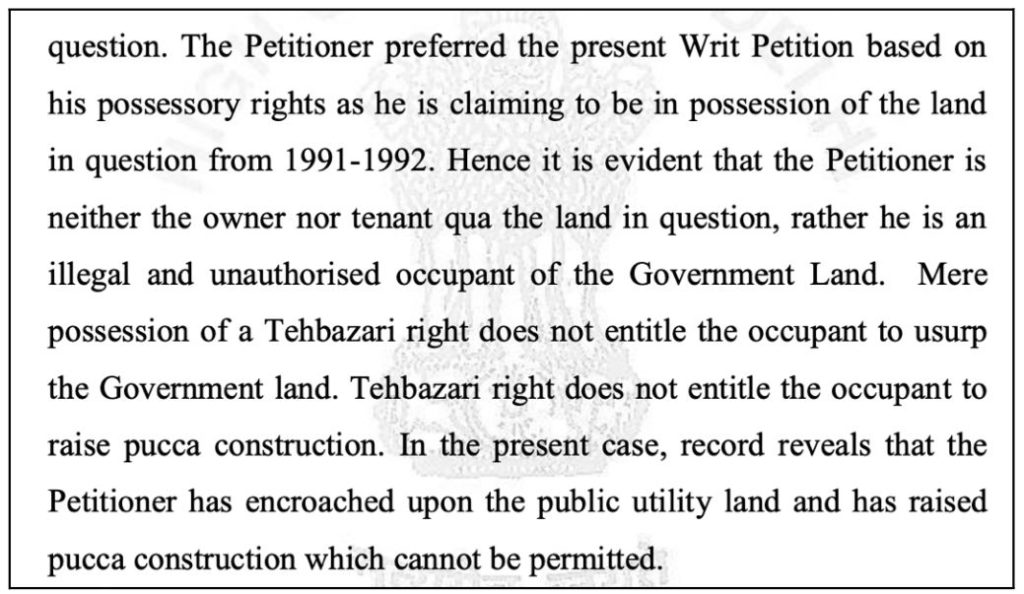
The High Court dismissed the plea and directed the respondent authorities to refund the deposited amount of the petitioner after deducting the damage charges for using the property.
Featured Image: Review of Court Judgments


